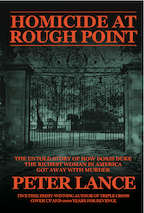
When I learned that a colleague whom I'd worked with in my television journalism days had delved into a murder case, I was intrigued. When I learned that he'd uncovered indisputable facts revealing that Doris Duke, the richest woman in America, got away with the murder, I had to get the details.
Peter Lance's story first ran in Vanity Fair, and I couldn't put it down. Yet Peter took things further. His broader research went into a book -- Homicide at Rough Point -- that makes for even more compelling reading.
This space is usually reserved for my own musings -- the ideas that inspire me, the work that drives me. Yet Peter Lance's efforts reflect a particular aspect of the writer's craft that often goes unheralded: the legwork.
When I finally pick up a pen or put my fingers on a keyboard, I've spent weeks or months doing research and surveys and tests and analysis to guide me toward the quintessential truth about my own or a client's objective. Get it right, and it helps to create the desire to buy things. Or to solve an unsettling mystery whose suppression was something that money could buy.
Peter Lance's story first ran in Vanity Fair, and I couldn't put it down. Yet Peter took things further. His broader research went into a book -- Homicide at Rough Point -- that makes for even more compelling reading.
This space is usually reserved for my own musings -- the ideas that inspire me, the work that drives me. Yet Peter Lance's efforts reflect a particular aspect of the writer's craft that often goes unheralded: the legwork.
When I finally pick up a pen or put my fingers on a keyboard, I've spent weeks or months doing research and surveys and tests and analysis to guide me toward the quintessential truth about my own or a client's objective. Get it right, and it helps to create the desire to buy things. Or to solve an unsettling mystery whose suppression was something that money could buy.


 RSS Feed
RSS Feed